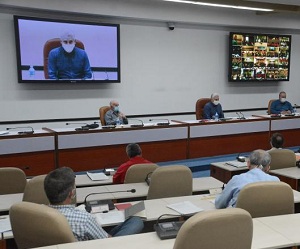 The President of the Republic, Miguel Díaz-Canel Bermúdez, stated that Cuba will overcome the difficult situation imposed by COVID-19 and the U.S. blockade, because we can do thousands of things better, with the many shared ideas to be implemented more aggressively and, above all, because we have the work of the Revolution ahead of us and we must defend it with passion.
The President of the Republic, Miguel Díaz-Canel Bermúdez, stated that Cuba will overcome the difficult situation imposed by COVID-19 and the U.S. blockade, because we can do thousands of things better, with the many shared ideas to be implemented more aggressively and, above all, because we have the work of the Revolution ahead of us and we must defend it with passion.
Heading the June meeting of the Council of Ministers, chaired by Prime Minister Manuel Marrero Cruz, the President reported that documents on the National Plan for Economic and Social Development through 2030 and the Strategy for the Strengthening of the Economy in a Prolonged Period of Crisis are prepared and in the process of being approved, and should be ready early in July.
We can make great progress in their implementation, he said, and arrive at the next Party Congress with assessments of what we have done during this time.
This is a more strategic task, the President noted, “but now we need immediacy and a working reaction, to transform the economy’s performance, with more intensity and, above all, with innovation.”
He insisted on three fundamental tools that must be used more intensively: innovation, social communication and computerization.
In the exchange with members of the Council of Ministers, Díaz-Canel referred to “the subversive offensive in social media, which is extremely aggressive, since they are bothered by what we have achieved, that amidst all this, we are moving forward.”
Every day, Diaz-Canel said, a vast number of outrageous lies, speculations, and exaggerations are spread, which we must expose and denounce.
Around the world, he recalled, many, many doctors have died, and in Cuba we have not seen one death among health personnel. On the planet, 80% of COVID patients who reach serious and critical condition die, but we save 80%. We have done all this despite the blockade, a reality that Cuba has faced for more than 60 years.
The people have confidence in what we have achieved, he emphasized, and we are going to continue strengthening our work, the values we defend, our history, our culture and the example we have given the world.
Deputy Prime Minister Alejandro Gil Fernández reported on the status of the country’s economy, noting, that the first six months of the year have been exceptional, with both the tightening of the illegal U.S. blockade, and the pandemic since the second half of March, when the decision was made to interrupt some activities, including tourism, which evidently had an impact on the economy, with imports and exports decreasing significantly.
As a favorable trend, he pointed out increased sales by mixed and national enterprises in the Mariel Special Development Zone.
In addition, he reported that 12 projects with foreign capital have been approved and negotiations for three more are advancing.
Minister of Finance and Prices Meisi Bolaños Weiss presented a proposal to be submitted for approval to the National Assembly of People’s Power, regarding adjustments to the state budget, given the impact the pandemic.
She pointed out that, to support the COVID-19 battle, an increase of approximately one billion pesos in the budget was required, which in turn means that a significant reduction in expenses is needed, “Because we cannot spend what we do not generate.”
Additionally, Minister of Culture Alpidio Alonso Grau presented a summary of work done by the National Program against Racism and Racial Discrimination government commission, headed by President Díaz-Canel and including more than thirty state entities and civil organizations, charged with combating and eliminating vestiges of racism, racial prejudice and discrimination that persist in our society.
With nearly ten points on its agenda for the day, the Council of Ministers addressed a wide range of issues and was attended by the Communist Party of Cuba Central Committee’s second secretary, José Ramón Machado Ventura; the President of the National Assembly of People’s Power, Esteban Lazo Hernández; and Vice President of the Republic Salvador Valdés Mesa.
Also discussed were reports from the Institute of Physical Planning, and the Ministry of Domestic Commerce, as well as the proteic plant program conceived by Comandante en Jefe Fidell Castro.
(Source:Granma)